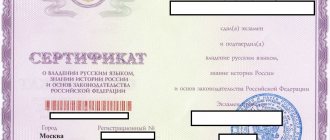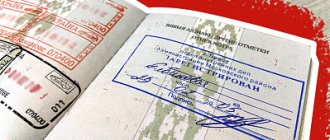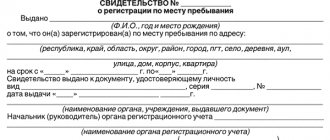The concept of place of residence in civil law
The place of residence of a citizen is the most important category, thanks to which it is possible to determine the legal status of each person (including minor children under the age of 14 years).
In particular, this legal category is associated with the recognition of a person as missing or, for example, dead. In addition, it is to the address of the actual place of residence that claims, summonses and other documents that have important legal significance for each person are sent.
The definition of the very definition of “place of residence of a citizen” is given in Art. 20 Civil Code of the Russian Federation. So, this category means the place where a certain subject of legal relations (i.e., a citizen) permanently or advantageously resides. Thus, we can conclude that residential buildings (houses, apartments, dormitories, communal apartments) in which a person lives on the basis of ownership, a lease or sublease agreement, a rental agreement, etc. are taken into account to a greater extent.
What is place of residence
In accordance with the law, the place of registration is the place where a citizen permanently or primarily resides as an owner or under a rental (sublease) agreement, social tenancy or on other grounds provided for by the legislation of the Russian Federation.
These are the following objects:
- House;
- apartment;
- service living quarters;
- specialized homes (dormitory, hotel-shelter, house of maneuverable fund, special home for single and elderly people, boarding home for the disabled, veterans, etc.);
- other residential premises.
In practice, the difference between place of residence and place of stay is not always obvious; sometimes these are the same objects or premises. The distinction is made according to the period of residence, documents certifying registration (stamp in the passport or certificate).
You must register at your permanent residence address within 7 days from the date of arrival. The following documents are required for this:
- identification document;
- application in the prescribed form;
- a document that, in accordance with the housing legislation of the Russian Federation, is the basis for moving into a residential premises: a lease agreement, a certificate of ownership (extract from the Unified State Register of Real Estate), an application from the owner about moving in, a court decision, etc.
The deadlines for processing documents here are the same as in the case of temporary registration. With consent to permanent registration of tenants, owners and members of their families, the situation here is as follows:
- To register in municipal housing, you must obtain the consent of all those registered. Moreover, the submitted documents will go to a special commission, where the owner of the residential premises (for example, the city) will make a decision on the possibility of registration in this residential premises.
- For permanent registration in owned housing, the consent of all co-owners is required. But the consent of the remaining registered persons who are not the owners is not required.
What documents will be issued/what will be processed?
- Certificate in form No. 8 (for persons under 18 years of age).
- A stamp in the passport confirming deregistration at the previous address of residence.
- A stamp in the passport confirming registration at the new residence address.
Characteristics of the concepts “place of stay” and “place of residence”
Often, due to the illiteracy of the common population, such concepts as place of residence and place of stay are not distinguished. In addition, such confusion arises due to the fact that modern legislation does not provide for a unified interpretation of these definitions, therefore specialists in various fields see completely opposite characteristics in these categories.
If we turn to the Housing Code and the Civil Code of the Russian Federation, then by these definitions, first of all, the legislator understands the connection of a citizen (including a minor child and an incapacitated person) with a certain living space. If we analyze the interpretation of the concept under Federal Law No. 5242-I, we can clearly distinguish between the characteristics of the place of residence and place of stay:
- Place of residence is the place in which a citizen permanently or primarily resides on the basis of any right (ownership, lease, rental, etc.). These places include: apartment, house, hostel.
- Place of stay is the place where a citizen arrived for a temporary stay. First of all, these are hotels, tourist centers and boarding houses, sanatoriums and countryside complexes, hospitals and correctional institutions.
Thus, these two important categories should be distinguished, since they determine completely different legal status of the individual.
Place of stay
Place of residence means an immovable object in which a citizen is temporarily located. Such a place can be rented housing, a hotel, a boarding house, a medical facility, a health care facility, a boarding house, etc. Based on Russian legislation, a citizen must submit information about himself to the passport office or house management office if he has not been living at his main place of registration for more than 90 days. In this case, the citizen is issued a temporary registration. Its term is up to 5 years, and the citizen is not removed from his primary place of registration. In order to register at the place of residence, a citizen, in addition to the application, must provide the following documents:
- Passport;
- A document confirming the grounds for temporary residence (social tenancy agreement, rental agreement, consent of the homeowner to move in).
Important! If a person is in a hotel, boarding house, rest home or hospital, then the administration of these institutions is responsible for his registration.
Determining the place of residence of children under 14 years of age
One of the most difficult issues in legal practice is determining the place of residence of a child who has not reached the age of 14 years. This is due to the fact that this topic is of an intersectoral nature, which simultaneously affects both family and civil legislation.
If we refer to Art. 20 of the Civil Code of the Russian Federation, this act states that the place of residence of a child under the age of 14 will be considered the place where his legal representatives live. These can be both parents and guardians, adoptive parents, etc. Thus, we can conclude that the child is partially limited in his right to freely choose his place of residence. This is due to the fact that he has not yet been recognized as a fully capable citizen of the Russian Federation.
In situations where disputes arise about the place of residence of a child when the parents live separately, Art. 65 RF IC. This legal norm stipulates that all conflict situations are resolved through the courts. In this case, the interests and rights of the child are taken into account first. But the relationship that has developed between the child and parents, guardians or adoptive parents is also taken into account.
However, despite the fact that the legislation provides for regulatory articles that regulate this issue, some nuances remain undeveloped, which to a certain extent complicates the resolution of disputes about the place of residence of a child under the age of 14 years.
Registration of citizens at place of residence
Legislative regulations establish and fix the rules according to which every citizen located on the territory of the Russian Federation must register at the place of his residence or stay. The procedure for registration of subjects of legal relations in Russia is established not only by civil and housing legislation, but also by federal and regional laws.
To carry out registration at the place of residence or stay in a state body vested with such authority, an individual must provide a complete list of official documentation, including:
- Birth certificate (this document is required for registration of minors under 14 years of age).
- A passport issued on the territory of the Russian Federation.
- Passport of a citizen of the USSR, issued according to the 1974 model (specific cases of the need to provide this type of document are prescribed in the legislation of the Russian Federation).
- For registration purposes, an application signed by a citizen who is the legal owner of the real estate in whose territory the individual will be registered is also necessary.
- If registration is carried out on the territory of housing that was issued under a lease, sublease or lease agreement, then the written consent of the landlord must be provided to the state registration authority to carry out such an action.
- If a citizen, before moving to a new place of residence, deregistered at the previous address, he should be provided, if available, with a departure certificate.
Based on this documentation, the authority will register the citizen, then a stamp will be affixed to the identity document, as well as to the unified state register.
Distinctive features between location and residence address
The difference between the place of residence and the place of actual residence is characterized by the following factors:
- period of stay;
- grounds for using a residential property;
- type of property;
- availability of registered registration;
- registration agency;
- citizen's rights to premises.
Thus, place of residence often implies the presence of rights to property, and residence is characterized only by a registration stamp.
Address of the actual residence
Individuals who frequently move around the country need to understand what their actual place of residence is, including that of a child.
This address is not associated with the registration stamp in the passport. That is, the place of residence in fact is the apartment where a person spends most of his life, as well as what infrastructure of the locality he uses. For example, an individual is registered in the city of Belaya Kalitva, but works and lives in Moscow.
Address and place of residence
Location address is a residential property where an individual is located on the basis of temporary registration.
These institutions are:
- hotels, hotels, sanatoriums;
- hospitals, health resorts, hospitals;
- colonies, pre-trial detention centers;
- an apartment or house used under a lease agreement for more than 3 months.
The place also looks like a registration, i.e. the citizen has:
- Stamp on an identity document. The passport is issued to individuals over the age of 14 years.
- Certificate in form No. 8 from the Ministry of Internal Affairs of Russia, as an annex to registration records for minors who have not reached 14 years of age.
- Mark in the form of Appendix No. 4 for foreign applicants based on Order of the Ministry of Internal Affairs of the Russian Federation No. 881.
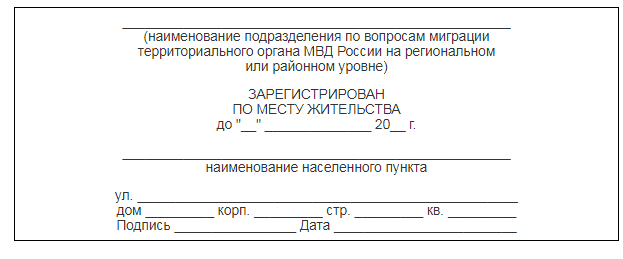
Sample mark according to form No. 4
Additional paper confirming the residence address of a person, which differs from the stay - documents confirming temporary stay in an apartment, facility or institution. Temporary registration is issued according to Form No. 3. This document, as well as paper according to Form No. 8, is given to the citizen as confirmation of “check-in” to the room.

Sample of temporary registration according to form No. 3
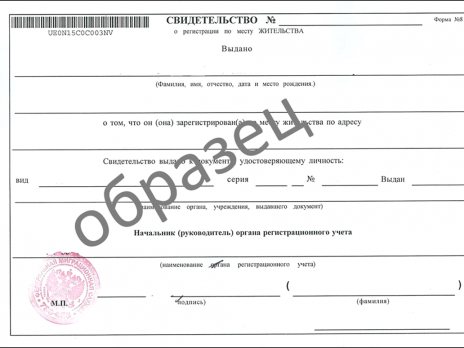
Sample according to form No. 8
Registration is also certified by a certificate issued in Form No. 9. The document should be ordered separately, since it contains information not about one individual, but about all family members.
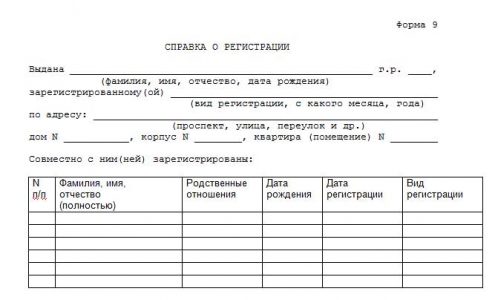
Sample certificate of registration according to form No. 9
Order of the Ministry of Internal Affairs of Russia dated November 23, 2017 N 881 “On approval of the Administrative Regulations of the Ministry of Internal Affairs of the Russian Federation for the provision of public services for the implementation of migration registration of foreign citizens and stateless persons in the Russian Federation, application forms for registration of a foreign citizen or stateless person at the place of residence , notifications of the arrival of a foreign citizen or stateless person at the place of stay, notes on the registration of a foreign citizen or stateless person at the place of residence, marks confirming the completion by the receiving party and the foreign citizen of the actions necessary for his registration at the place of stay"
Read also: How to get a disability
Do they have to match?
Situations in which a person’s addresses differ are found everywhere. However, according to the legislation of the Russian Federation, information about registration and place of residence must match. When a citizen stays in the same apartment for a long time, it is necessary to obtain permanent registration. However, in reality, the place of registration and the place of actual residence are often different, and individuals ignore the provisions of the law on sending a notice to the authority.
Note: if a person rests and lives in a house and does not have permanent or temporary registration, then supervisory authorities have the right to impose penalties against him.
Thus, if the location does not coincide with the actual residence, a notification should be sent to the government agency. This state of affairs deprives a person of a number of civil rights:
- participation in elections;
- attachment to a secondary educational institution.
To initiate registration, you need to contact the migration department and submit the following documents:
- application in the prescribed form;
- passport of a citizen of the Russian Federation;
- papers confirming the right to reside and use a residential property (for example, a lease agreement).
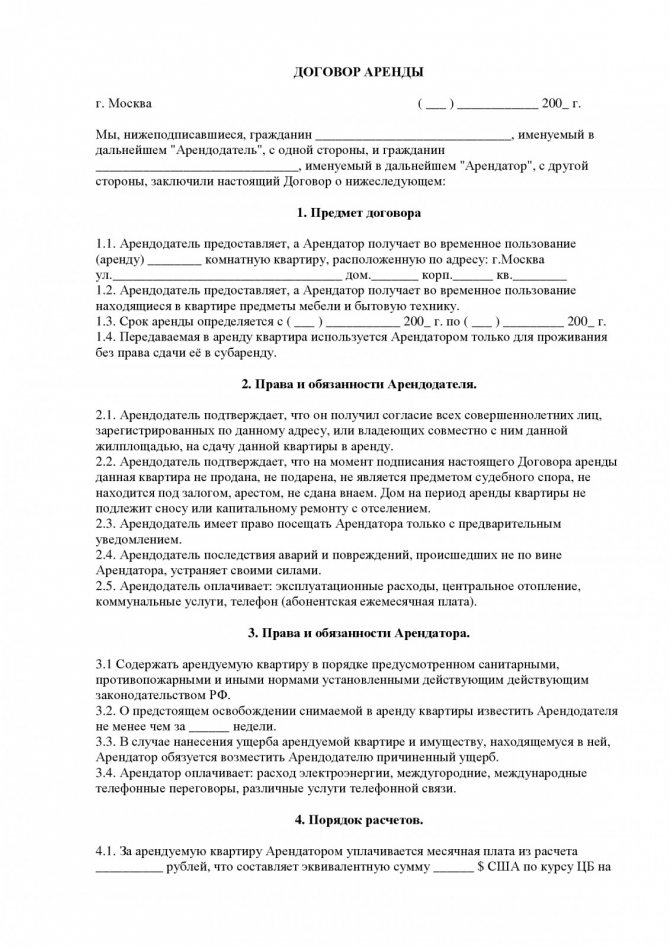
Sample rental agreement
The text of the application should include the following information:
- Full Name;
- Date of Birth;
- citizenship;
- passport information;
- address of the planned settlement, including obtaining temporary registration;
- papers confirming ownership of the property;
- indication of the address of early registration.
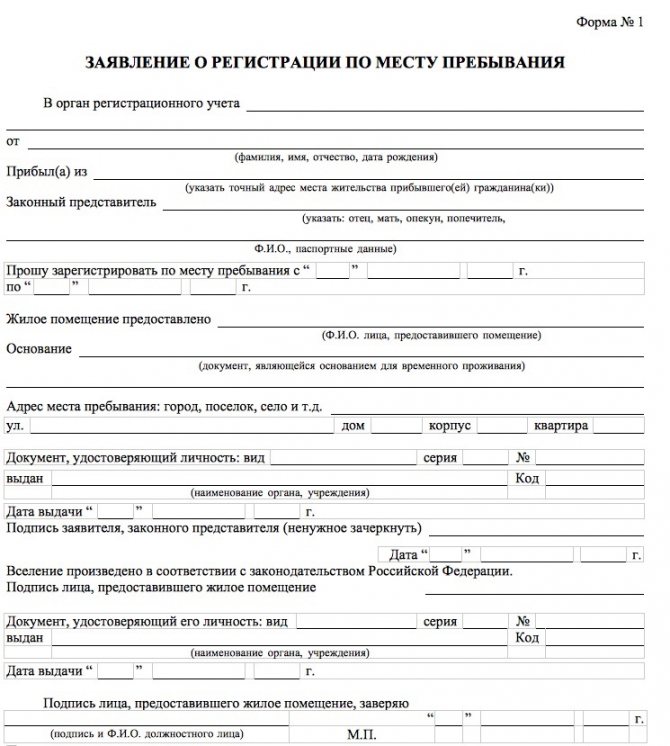
Sample application for registration at the place of stay
The documentation is handed over personally to the department of the institution or sent by Russian Post (registered letter with notification, list of contents).
Consequences of late registration of a citizen
The legislation of the Russian Federation clearly regulates the procedure for state registration of citizens, therefore the legal acts give exact deadlines for when an individual should register at a new place of residence.
So, in Art. 19.15 of the Code of Administrative Offenses of the Russian Federation states that if a citizen does not go through the registration procedure within seven days, then administrative liability is imposed on him. The sanction in this case implies a fine in the amount of 1,500 to 2,000 rubles.
In addition, the owner of the property may also be responsible for late registration at a citizen’s place of residence. In this case, the norm enshrined in Part 2 of Art. 19.15 Code of Administrative Offenses of the Russian Federation. A fine is imposed on the guilty person, the amount of which ranges from 2000 to 2500 rubles.
It should be remembered that the calculation of the 7-day period begins only from the moment the subject arrives at his new place of residence, and not upon deregistration from the previous registration. Due to ignorance of this nuance, many citizens fall for the tricks of the migration service, whose employees unlawfully draw up reports of administrative offenses.
If this happens, the citizen has the legal right to appeal to the authorized body to appeal such a decision. In particular, the application can be addressed to a higher authority or a court, but no later than 10 days from the date of receipt of the protocol.


